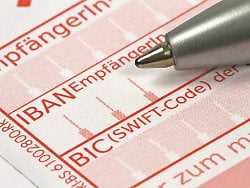Questions and answers about Swift
The “nuclear bomb” under the sanctions
2/23/2022, 6:44 p.m
Most recently, the Ukrainian ambassador in Berlin called for Russia to be excluded from the Swift global payment system because of its aggression against the neighboring country. But serious consequences, not only for Russia, make decision-makers in the West hesitate. ntv.de explains why.
What is Swift?
Almost everyone knows the BIC or Swift code from their bank’s transfer form. This is the international bank code of the Society for Worldwide Interbank Financial Telecommunication, Swift for short. The is a cooperative organization based in Belgium, which brings together more than 11,000 banks and other financial institutions. Swift provides the highly secure system that these institutions use to communicate with all of their international payments. According to Swift, it transmits an average of 40 million messages per day between the participating banks.
How could Russia be left out of Swift?
Swift is a private organization governed by EU law. Governments or the EU Commission have no direct influence on the company’s decisions. But where there is a will, there is a way: In 2012, the US Congress passed financial sanctions against managers of the organization if they continue to process payments with Iranian banks. The EU heads of government followed suit, and the pressure continued to grow: finally, Iranian banks were locked out of the communications system, and the economic consequences for Iranian oil exports and foreign trade are dramatic.
All Russian financial institutions would be barred from international payments. Transfers to and from Russia in the form that is usual today would no longer be possible. “It would bring trade to a standstill in its current form for the time being,” said Janis Kluge from the think tank Stiftung Wissenschaft und Politik Capital.de. When in 2014, after Russia’s annexation of Crimea, a Swift exclusion was discussed, the then Russian Prime Minister Dmitry Medvedev spoke of a “declaration of war”. Calculations by the Russian Ministry of Finance predicted a five percent drop in economic output in the event of an exclusion. Iran is often cited as an example of the consequences of a Swift exclusion. From 2012 onwards it was practically no longer able to sell any oil on the world market and could hardly import any goods. The country plunged into a serious crisis.
What side effects would you fear?
According to Heinrich Steinhauer, representative of Landesbank Hessen-Thüringen in Moscow, a Swift exclusion would be “a kind of atomic bomb” with catastrophic consequences not only for Russian banks and companies, but also for many German banks, for example. It would amount to a gigantic debt relief for Russian customers because repayments of liabilities to the banks would no longer be possible. With the payment transactions, Russian gas and other raw material deliveries to Europe would probably come to a standstill, which could lead to a price explosion and possibly devastating bottlenecks.
What alternatives does Russia have?
Cash couriers or cryptocurrencies are often mentioned as possible alternatives to international payments via Swift. However, Russia expert Kluge doubts that at least Western companies would embark on such legally unsafe payment methods. This also applies to the alternative payment system called SPFS, which was developed by Russia’s central bank itself in the course of the Crimean invasion. Russia’s financial institutions could possibly also process payments via China’s CIPS system. Both countries recently announced that they want to develop a joint Swift alternative. However, this is unlikely to be ready for use in the near future and will then mainly be relevant for bilateral trade. One concern, however, is that a possible Swift ban, or even the discussion about it, will help push such alternatives and thereby undermine the influence of Europe and the US on the global financial system.
The Swift exclusion is repeatedly demanded as the ultimate sanction against an aggressor who can hardly be stopped with conventional sanctions, most recently by Andriy Melnyk, the Ukrainian ambassador in Berlin. According to various reports, the Swift ban is not yet one of the measures prepared by the western states. The concern about the side effects is too great. However, neither the US government nor the federal government nor the EU Commission have completely ruled it out.
